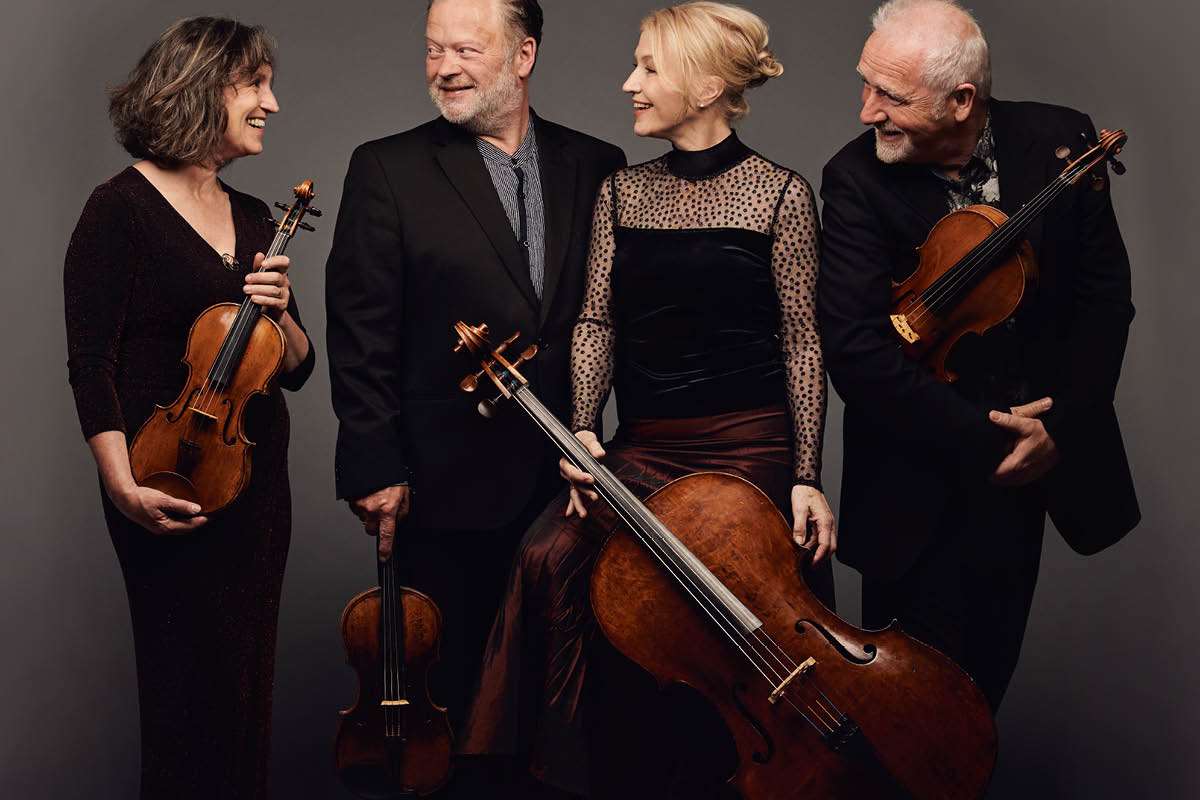
The Canberra International Music Festival has announced its 2023 program, with 28 concerts, 150 international and Australian artists, and five premieres to grace the Australian capital in the midst of autumn. Artistic Director Roland Peelman highlighted the wonder and magic found at the heart of the Festival, which runs from 28 April to 7 May and centres around the heritage Fitter’s Workshop in Kingston.
“The Child Within, Listening to a New World is the festival’s theme for 2023, celebrating the enchanted forest of our children’s imagination. Through the magic of music, it seeks to find the child inside all of us,” said Peelman.
Following the success of The Creation in 2022, the Opening Night Gala will see the Australian Haydn Ensemble perform The Mozarts, the Haydns & the Bear, a playful program that celebrates the bond between friends and families intertwined through music. Tenor Andrew Goodwin and soprano Chloe Lankshear join as soloists.
Brodsky Quartet. Photo © Sarah Cresswell.
The festival’s headline acts begin with a captivating combination: the UK’s Brodsky Quartet plays with William Barton on 30 April in a program of Bach, Schubert and Barton’s own works. The program also includes the premiere of Andrew Ford’s String Quartet No 7: Eden Ablaze, written about the 2019 bushfires that ran through the town and the Gondwana Rainforests for the first time, as well as the first concert performance of Ford’s In My Solitude.
On 29 April, the Brodsky Quartet celebrates its 50th anniversary with a selection of its finest repertoire. Originally founded as the Cleveland Quartet, previous collaborators include Paul McCartney, Elvis Costello and Björk, and Katie Noonan, whose 2016 album with the quartet, With Love and Fury, was nominated for the Best Classical Album ARIA Award.
William Barton also joins forces with Aunty Marlene Cummins for Marloo’s Blues, in which Cummins tells her story of adversity and triumph as an Indigenous musician and activist. They will perform with the Djinama Yilaga Choir, who appear with the festival for the first time.
Musical family ties re-emerge in a concert called Sibling Revelry, where the works of the Mendelssohns, Boulangers and Australian twins Martin and Peter Wesley-Smith are celebrated alongside each other. The concert also features the teeming talent of Melbourne’s own siblings, Flora and Theo Carbo, who premiere a new work for the Festival.
The 100th birthday of Hungarian-Austrian composer György Ligeti – whose music was famously used in Stanley Kubrik’s film 2001: A Space Odyssey – will be marked by the Festival in a collaboration with the ANU School of Music on 1 May.
French quartet Quatuor Van Kuijk return to the festival for a lineup of Mendelssohn, Fauré and Schubert. They also perform at Taste of the Country alongside violist Katie Yap, pairing wine, music and food. The Festival’s breakfast series is back as French For Breakfast from 1–6 May; a series of daytime events will take place at Verity Lane Markets as well as two Saturday night events, presenting the work of local BIPOC artists.
Marlene Cummins. Photo supplied
Alexander Gavrylyuk performs a solo recital, Andrew Goodwin performs by candlelight, and Sonya Lifschitz presents a new multimedia performance at the National Gallery of Australia, all in honour of Ukraine.
This thread is followed with a headline event of Britten’s The Children’s Crusade, to be performed by the Luminescence Children’s Choir. Theatre pioneer and poet Bertolt Brecht had his words set to music in a pacifist’s plea that finds itself as relevent as ever almost 50 years after its first performance.
The Festival also presents a rare performance of the recently rediscovered Dunera Mass. In September 1940, 2542 ‘enemy prisoners’ from Britain arrived in Melbourne and Sydney on board HMT Dunera. Most were Jewish refugees who had fled Nazi persecution, and included musicians, artists, writers, scientists and philosophers. Interned in camps near Hay and Orange in NSW and Tatura in NSW, they became know as the ‘Dunera Boys’. Released in 1941, many of them chose to remain in Australia. This CIMF program re-enacts a concert held in Hay in 1941, which featured music written on board the ship by Peter Meyers, who arranged for the Mass’s first performance.
Other new works include Elliott Gyger’s Solitaire, a solo viola work to be performed by James Wannan. Katie Yap and harpsichordist/keyboardist Donald Nicolson premiere Black Cockatoos as part of Yap’s Freedman Classical Fellowship project Multitudes, where she aims to find unity and cohesion within a multifaceted musical approach. Dan Walker also offers a new work for dance, to be hosted in the Arboretum as part of the Festival’s new collaboration with Australian Dance Party in celebration of Danceweek.
The Canberra International Music Festival runs 28 April – 7 May. Tickets for members go on sale on Friday 18 November at 10am. More information can be found here.